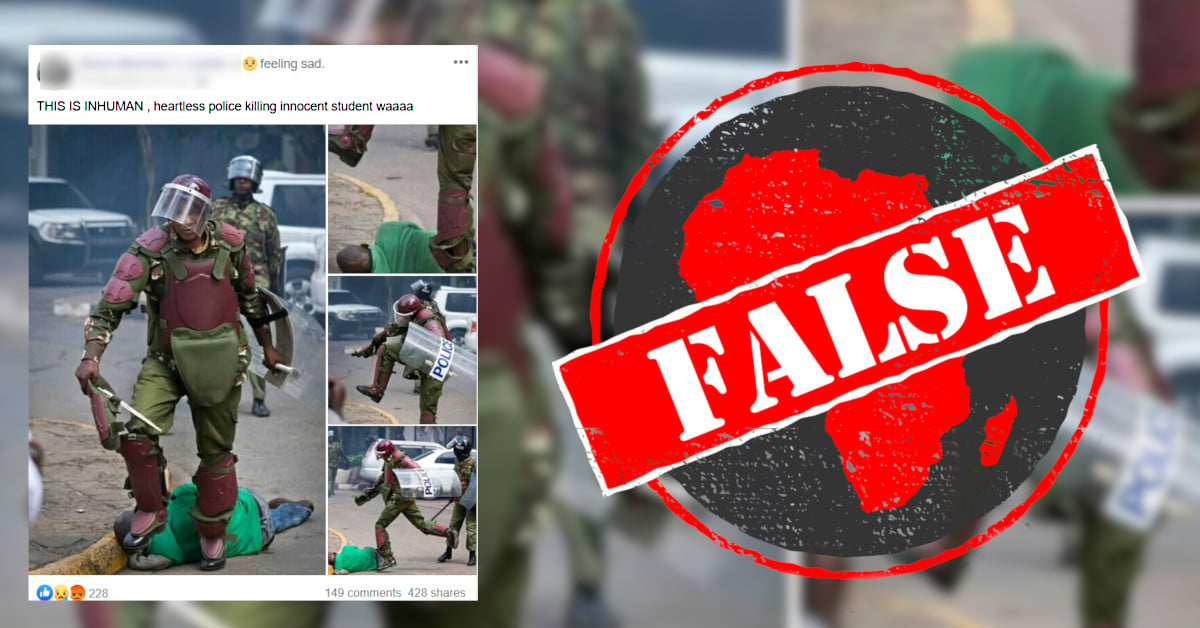On 11 November 2019, students from the Jomo Kenyatta University of Agriculture and Technology in Nairobi, Kenya took to the streets to protest lack of safety on campus and inaction by the authorities.
At first peaceful, the protest quickly turned into running battles with the police. The university was shut indefinitely.
Hours later, an amateur video of police beating up a student during the protest was published online. It sparked an uproar that prompted an investigation of the officers involved.
A day later, a Facebook user shared a series of photos of Kenyan cops assaulting a man lying on the ground. The user claimed they showed police attacking yet another student.
“THIS IS INHUMAN, heartless police killing innocent student waaaa,” he captioned the post.

A reverse image search reveals the photos are real. But they are three years old, taken in 2016.
The photos were snapped by Associated Press photographer Ben Curtis. One of them is captioned: “In this Monday, May 16, 2016 file photo, a Kenyan riot policeman repeatedly kicks a protester as he lies in the street after falling down while trying to flee from them, during a protest in downtown Nairobi, Kenya.”
At the time, opposition leaders had called their supporters to the streets ahead of the 2017 general elections demanding that the Independent Electoral and Boundaries Commission be dissolved because of its alleged bias and corruption.
The photos received local and international attention. – Dancan Bwire
At first peaceful, the protest quickly turned into running battles with the police. The university was shut indefinitely.
Hours later, an amateur video of police beating up a student during the protest was published online. It sparked an uproar that prompted an investigation of the officers involved.
A day later, a Facebook user shared a series of photos of Kenyan cops assaulting a man lying on the ground. The user claimed they showed police attacking yet another student.
“THIS IS INHUMAN, heartless police killing innocent student waaaa,” he captioned the post.

Photos of 2016 election protest
A reverse image search reveals the photos are real. But they are three years old, taken in 2016.
The photos were snapped by Associated Press photographer Ben Curtis. One of them is captioned: “In this Monday, May 16, 2016 file photo, a Kenyan riot policeman repeatedly kicks a protester as he lies in the street after falling down while trying to flee from them, during a protest in downtown Nairobi, Kenya.”
At the time, opposition leaders had called their supporters to the streets ahead of the 2017 general elections demanding that the Independent Electoral and Boundaries Commission be dissolved because of its alleged bias and corruption.
The photos received local and international attention. – Dancan Bwire
Republish our content for free
For publishers: what to do if your post is rated false
A fact-checker has rated your Facebook or Instagram post as “false”, “altered”, “partly false” or “missing context”. This could have serious consequences. What do you do?
Click on our guide for the steps you should follow.
Publishers guideAfrica Check teams up with Facebook
Africa Check is a partner in Meta's third-party fact-checking programme to help stop the spread of false information on social media.
The content we rate as “false” will be downgraded on Facebook and Instagram. This means fewer people will see it.
You can also help identify false information on Facebook. This guide explains how.


Add new comment